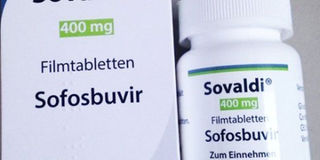WHO approves generic drug to treat hepatitis C

Sofosbuvir. The World Health Organization has approved this drug. FILE PHOTO | COURTESY
What you need to know:
- Treatment for hepatitis C under patent has been notoriously highly priced, putting it out of reach for many patients.
- It is estimated that 325 million people globally are suffering from chronic hepatitis B or hepatitis C.
In Paris, France
The World Health Organization has approved the first generic version of sofosbuvir, a critical drug in the treatment of hepatitis C.
This development could expand access to treatment by increasing the number of quality-assured generic medicines in the market.
BREAKTHROUGH
Sofosbuvir, a 400mg tablet, is manufactured by Mylan Laboratories Ltd India.
“This is a breakthrough medicine with a 95-per cent cure,” Suzanne Hill, director of essential medicines and health products at WHO, said.
The WHO pre-qualification approval means the product can now be procured by the UN and financing agencies such as Unitaid, which now includes co-infection with HIV and hepatitis C in the portfolio of diseases it covers.
PURCHASE
Treatment for hepatitis C under patent has been notoriously highly priced, putting it out of reach for many patients.
“The first WHO-prequalified generic of this product will give large procurers and countries the assurance of quality for an affordable product,” Dr Hill said at the 9th International Aids Conference in HIV Science in Paris.
Currently, countries such as Kenya, Indonesia, Vietnam, Cambodia, Myanmar, Mongolia, Nepal, Rwanda, Uganda, Zambia, Ethiopia, Pakistan and Egypt are already procuring generic versions of sofosbuvir.
SAFETY
The fact that WHO has prequalified one of the generics will give the countries extra guarantee of the product’s quality, safety and efficacy.
It is estimated that 325 million people globally are suffering from chronic hepatitis B or hepatitis C.
The WHO also estimates that about 1.3 million died from the liver-damaging disease because they did not have access to life-saving treatment.
ANTIVIRAL
Mylan’s sofosbuvir tablets, which are produced under licence from Gilead, are the first generic version of the direct acting antiviral to be approved under the WHO pre-qualification programme and will be available in developing countries to treat hepatitis C.
“Direct acting antiviral medicines such as sofosbuvir are highly effective for treating and curing chronic hepatitis C infection.
"But, at best, one out of 10 people in need had access to these medicines in 2015,” Gottfried Hirnschall, WHO director of the HIV department, said.
“Pre-qualification of the hepatitis C medicine for the first-time is therefore exciting news, ahead of World Hepatitis Day next week.”
SHORTAGE
Dr Hirnschall added that the estimated cost of a three-month treatment regimen with the generic drug will be around Sh26,000 (US$ 260).
This approval comes at a time when scientists have warned of a perennial shortage of hepatitis C treatment drugs in sub-Saharan countries like Kenya, blaming this shortage on lack of funding.
To date, there has been little research on hepatitis C therapy in resource-limited settings, and access to care and treatment is limited.
RESEARCH
At the same time, manufacturing companies have also been accused of not giving priority to the drugs because of pattern changes and prices.
As a result, scientists have come up with a new treatment believed to be effective in resource limited countries.
Dr Karine Lacombe, an associate professor at Saint-Antrine Hospital, Inserm, France, said that results of preliminary clinical trials conducted in some African countries showed that the new treatment for hepatitis C virus (HCV) is effective.
TRIALS
Dr Lacombe and her colleagues conducted the TAC ANRS 12311 trial, to assess the feasibility, efficacy and safety of interferon-free DAA treatment in Cameroon, Ivory Coast and Senegal.
Starting in October 2015, the study, sponsored by the French National Agency for Research on Aids and Viral Hepatitis (ANRS), enrolled 120 adults who had not previously been treated for hepatitis C; 110 of them were included in this preliminary analysis.
SCREENING
The preliminary results from the trial study show that direct acting antivirals (DAAS) against hepatitis C can be very effective in the resource limited countries as in the developed world.
Based on these findings, “It is time to scale up HCV screening and advocate for treatment access for those in need in resource-limited countries, to make global HCV elimination a reality for all,” the researchers concluded.



